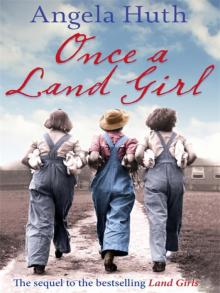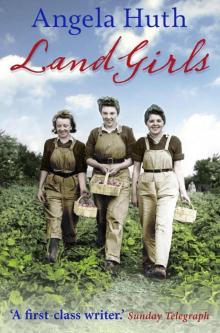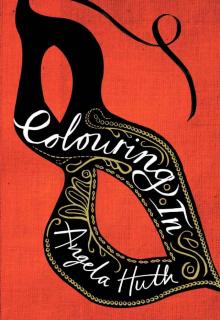- Home
- Angela Huth
Of Love and Slaughter Page 2
Of Love and Slaughter Read online
Page 2
‘Been meaning to get you here for ages. You must come again, whenever you want. Get to know the place. Now, go and enjoy yourself.’
‘Thanks, Papa.’
A few moments later he sat between Miss Hollow and Dusty in a tea shop, faced with pale, disappointing ice cream. It didn’t taste at all of strawberry. He wished there had been a van somewhere near selling those very white ice creams speared with a chocolate dagger. But the scones with cream and strawberry jam looked good. For some reason he could not understand he was allowed to eat these after the ice cream, which added to the strangeness of the afternoon.
‘Well,’ said Miss Hollow, ‘did you enjoy yourself, young Master Elkin?’
George nodded. His eyes avoided her dizzy-making chest.
‘And are you looking forward to taking it all over, running the firm, chairman?’
George weighed up his answer as he ate three more spoonfuls of the pink ice.
‘Not much,’ he said at last. ‘I’d rather stay on the farm, look after the animals.’
‘It’s all some way ahead, isn’t it?’ Dusty said to Miss Hollow. ‘He’s got plenty of time to make up his mind.’
‘By which time, of course, I’ll be long gone.’ Miss Hollow made her solemn prediction at the same time as biting into a scone top-heavy with jam and cream, so her words came smeary from a full mouth. But her intention was plain, and George felt no need to say he was sorry about that, because it would not have been the truth.
2
When George returned to Elkin, Anderson and Pease twenty years later, Miss Hollow was still there. She greeted him with the same rusty smile, quickly followed by a look of hostile annoyance. She made it clear he would be not only an interruption in the normal course of her day, but also an unwanted addition to the firm, where things had been done the same way for as long as she could remember.
George was to spend the morning in conference with his father and Bill Anderson. The old remaining partner was well past retiring age. Years of sorting out others’ problems had made him careless of his own: for too long he had ignored the ill health which now attacked him with force. He was to leave that afternoon after a farewell lunch with his lifelong friend David Elkin, and begin his retirement.
George sat, as he had twenty years ago, in a chair opposite his father, who was now further shrunk into his own chair. It still swung a little from side to side, creaking like an old boat fretting at its moorings. Bill Anderson was beside George, knees apart, trouser legs hitched up to reveal odd socks spiralling round legs of mulberry flesh. His waistcoat was encrusted with dried egg, dandruff powdered the shoulders of his jacket. When he turned to George there was a blast of halitosis. He ran a hand over the hairless freckles of his head. Jesus, thought George: in forty or fifty years’ time, that could be me. My retirement day: the handing over of the firm – to whom?
Miss Hollow brought in a tray of coffee, horribly weak in porcelain cups decorated with dragons. Mr Elkin, whose idea this meeting had been, plainly had no idea how to conduct it. He and Bill fell into conversation about some client who was disputing a will. Miss Hollow was asked to bring in a file, whose rotting covers scarcely managed to contain the disorganised papers within. It lay on the desk, still as bare as George remembered it. The telephone had not been updated, the blotter was still pristine. But the edges of the room had avoided any efforts of organisation on Miss Hollow’s part. Stacks of papers and decaying files had thickened like spring hedges, reducing the area of carpet and furniture. There would have to be a good many changes, George reflected. Considerable investment. But today was not the time for suggestions. Outside the sky was knobbled with cloud, the cathedral in sharp outline. The smell of cigar smoke still thickened the air. It was no wonder Mr Elkin gasped and coughed every few minutes. George longed to be outside, at work on the farm.
Two hours passed in inconsequential talk in which George was not included. He took the odd note to show that he was taking in the sort of thing he himself would shortly have to deal with, but in truth he learnt nothing. The firm’s finances were not mentioned, nor his salary, which his father had said would be discussed that morning. From what he could gather, those clients who had remained loyal to E, A & P for many years had been coming for advice on matters of a minor nature. George wondered, not for the first time, what the future held for the firm. He had his misgivings, though perhaps if he managed to modernise the whole place, bring it into line with contemporary life, replace Miss Hollow … it could stand a chance of surviving.
At midday Miss Hollow, by some pre-arrangement, appeared with four small glasses and a bottle of sherry. They all sipped at the oversweet stuff, constrained by the sadness of the occasion, but uncertain as to the procedure of a farewell ceremony. Mr Elkin raised his glass in Bill Anderson’s direction: George did the same. Miss Hollow, who had knocked back her sherry as if it were vodka, was left with an empty glass for the silent toast. Embarrassed, two scarlet spots high on her powdery cheeks, she left the room. David Elkin leant forward in his chair.
‘Emotional,’ he whispered.
‘Not sure I’m not feeling a bit the same myself.’ Bill Anderson pulled a dirty handkerchief from his top pocket and rubbed his eyes. ‘Can’t really believe it, not after so long. Going, I mean.’
‘Afraid I’ve slipped up concerning gold watches,’ David replied, striving for lightness. ‘Hope you understand.’ The two old boys laughed thinly at each other. ‘But there’s one thing young George and I must settle with you before you go.’ He made his fingers into a spire, moved them from side to side. ‘A final important matter, Bill. Our name …’
‘Your name?’ A single pink tear was running down Bill Anderson’s cheek. The handkerchief had been put away, but was brought out again to check its progress.
‘I mean, it’s jolly good your boy going into politics and all that. Could be Prime Minister one day. Just a bit … well, disappointing, I suppose you could call it, not to be taking over from you. And with no Anderson here, by rights we should give up your name. I’ve been envisaging that, and worrying about the rhythm. It would be quite spoiled, as you can understand, if Elkin and Pease were deprived of the Anderson. Don’t you agree?’
George could tell from his father’s grinding fingers the effort it was costing him to ease his way into this delicate matter. There was a long pause while Bill Anderson marshalled his agreement. He was both confused by the reference to rhythm – his dear partner had been showing signs of decay of late – and pleased at the thought that his name was required to live on in the firm. In fact, it had never occurred to him that on his leaving Anderson would go too. Of course: he would do the same as Henry Pease, leave his name where it had always been, between his friends.
‘No question, old boy,’ he said at last. ‘I should be most upset had you suggested erasing Anderson. It’s yours for as long as you want it.’
This called for second glasses of celebratory sherry, and two further tears to hesitate down Bill’s cheeks. David Elkin remained dry-eyed with relief.
That’s very good of you: thought it might be the answer. Can’t tell you how pleased George and I are, aren’t we, George? There’ll still be the rhythm. Applies to a firm of solicitors as well as to anything else.’
‘Quite.’
‘Now time for some lunch.’
The two old men stood up. They had known each other since they were children, worked together for forty years. They leant across the vast desk and shook hands. George looked away, not wanting to witness the weight of their professional parting. As his father did not return in the afternoon he began to go through papers and files, at some loss as to how to acquaint himself with the general disorder. Disinclined to take the swinging chair until the appropriate time, he sat in the muddle of Bill Anderson’s old office wondering what on earth he should do in the general scheme of things. A profound sense of gloom slowed his hands as they sifted through the papers.
It became apparent very quickly, during the
next six weeks that George worked alongside his father, that there was little work to be dealt with at Elkin, Anderson and Pease. The telephone rarely rang with clients requesting advice. There were few letters to be dictated to Miss Hollow, who took them down in slow shorthand in a notebook that must have been in use for several years. George’s sense of misgiving daily increased.
‘Of course, the arrival of these new people doesn’t help,’ pointed out his father one morning as the two of them sat either side of the barren desk, having dealt with the exiguous amount of post Miss Hollow had delivered. He glanced out of the window to avoid his son’s eye. ‘Just round the corner. Opened a few months ago. Slasher, Reed and Hedley – not what I call a serious name, but a lot of white marble and black glass frontage, as if it were New York. Can’t imagine how they got planning permission. But people are seduced by such fancy stuff. Give it a go, rather than come to a reliable old firm – I suppose you could say a touch Dickensian – like ours.’
‘I think,’ said George, after an interval in which he contemplated how best to make the suggestion he had been toying with since the day he had arrived, ‘we could probably could do with a little updating. Get a new telephone, for a start.’ His father’s mouth tightened. ‘A fax machine. Email. No office these days—’
‘We have a faxing machine somewhere, though I believe Hollow has some trouble working it. She says it’s not necessary.’
‘… a computer …’
‘A computer?’ The old solicitor looked suddenly close to tears. George saw in his face a gathering of elegantly phrased reasons as to why there was no need whatever for a computer. Then he saw the familiar raising of the white eyebrows, always a sign of willingness to oblige, to be thought reasonable. Action rarely followed,
‘Perhaps you’re right, boy. But machinery means investment.’
‘We could invest, couldn’t we?’
‘Daresay we could, a little. But there would still be the problem of poor Hollow. She’d never find her way round one of those things, any more than I would. They’re for your generation. They’re for the young.’
A long silence between them was brushed by the old man’s wheezing. Both knew what George was going to venture next, and both feared it.
‘Perhaps the time has come for Miss Hollow herself to move on …’
‘Move on?’ David Elkin’s eyes, dull brown beads in whites of sluggish yellow, jerked round all that was familiar in the room.
‘Go,’ said George.
‘I’d never have thought of that. I must say it would never have occurred to me, Hollow going.’
George remembered that, on rare occasions, his father considered loyalty more important than the truth.
‘It’s only that she’s … getting on, isn’t she? Excellent in many ways, loyal, knows the business inside out. But perhaps someone younger, trained in the technical skills essential these days—’
‘I understand you.’ Mr Elkin folded his hands, as if in prayer, on the virgin blotter. ‘But don’t ask me to do it, George. I couldn’t do that. Perhaps when I’m gone, that would be the time. It’s up to you what happens then. You can be the one to fire her, poor Hollow.’ His mouth twitched very slightly, prelude to a smile that died stillborn. ‘Many years ago your mother and I came across a rather good antique clock. With one accord we agreed it would be perfect for Hollow on the occasion of her retirement. I’ll see if I can find it. All I ask is that you give no indication that things might eventually be different.’
‘Of course not.’
‘So she’ll have a while left innocent of what’s to befall her. I’m glad of that.’
The old man had envisaged a couple more years working for the firm he loved, but in the event it was just two months after his partner retired that he himself left E, A & P for ever. Signs of general decline after the departure of Bill Anderson were followed by a bad attack of asthma and a week in hospital. He returned home to be looked after by Dusty, whose job, now she was married and had children of her own, had turned into that of a daily housekeeper. But the fight seemed to have gone out of him. Years of asthma had hastened his elderly appearance. On his return from hospital, shrunken and feeble, the determination to keep going that had been his stay for so long had all but disappeared.
‘It’s all yours, prematurely,’ he said to George his first evening home. ‘I’m sorry. So you must go ahead, boy, do what you think fit.’
As George looked upon his father, wrapped in rugs by the study fire, he reflected on the nature of swift change. One moment normality is on the march, the discipline of years practised every day. The next, the stuff of anticipation is snatched away so fast that those concerned are left ill equipped to deal with the new emptiness of life.
David Elkin, who had married in his mid-forties, had always been a father older than most. But it wasn’t until very recently that George had become aware of his real age – the struggle it now was for him, in his new slowness, to leave the house at eight in the morning: the look of exhaustion that shrivelled his face when he returned in the evening. Frailty descends so gently on those we love that it’s not until it has cast its entire web that the spectre of mortality becomes clear. George admired his father and had always loved him, but feared it was too late now to express that love. He cursed himself for not having shown – indeed, felt – more appreciation years ago. He felt ashamed when he remembered the embarrassment he had sometimes experienced in his youth when his father had entertained his schoolfriends, addressed them in his quaint, formal way, unable to contain small frowns of disapproval at shaven heads or ringed ears. Now, there was neither the time nor the opportunity to repair such things. Nor was there any means of dispelling the late regret.
The old man indicated he wanted more whisky. George refilled his glass although the doctor had advised against alcohol. He stoked up the fire. The house had never been well served by the ancient heating system – north winds blasted through the old window frames. Some said it was the cold that had caused Mrs Elkin’s pneumonia, thereby implying her husband’s lack of care. But George knew it was the cancer that had beaten her. Three weeks, only, between its detection and her dying. He remembered that time as the most terrible of his life – not, at six, completely understanding, but knowing his mother must be prayed for through clenched fingers. This new anticipation of an ending, therefore, though less mysterious, was not unfamiliar.
George did not have to wait long. His father died in his sleep a few days after his return home. Ever thoughtful of others, David Elkin had always declared that he would not want to be responsible, when the time came, for the damage to the funeral limousines (he had hesitated over the undertakers’ word, then endowed it with the trace of a sneer) attempting to drive up the narrow lane and the rutted track to the farm. In the middle drawer of his office desk George found his will: he had left instructions that his coffin should be transported to the church in a farm cart, drawn by the tractor, just as his wife’s had been. David Elkin had arranged her journey with great care: straw bales were placed so that she should not be rocked. George did the same for his father.
He was buried on a day of white frost and startling cold. His many friends, mostly farmers he had known all his life, came with black ties under their weatherproof jackets, distant-eyed. Bill Anderson, wearing a coat so thin it was as if he was bent on hurrying his own demise, wept throughout the service. Miss Hollow, who thought it best to appear cheerful at funerals, came in a red scarf and fragile shoes that made awkward her journey across the frost-clenched sods of earth to the graveside. Prodge and Nell, the Elkins’ nearest neighbours and George’s childhood friends, stood each side of him. It was the first time he had ever seen either of them dressed in black and it was almost his undoing – Nell’s solemn eyes and pale curls shining from the depths of an elderly shawl, Prodge’s boyish face hardened by the effort to withhold tears. George himself kept his hands clasped in front of him. He wore no gloves. The intense cold numbed his hands and he was glad
not to be able to feel his fingers, to feel anything.
When the burial was over the mourners gathered in the local pub for mulled wine and sausage rolls. George was conscious of the strange, pleasant sense of his body thawing. After several glasses of the highly spiced wine he felt himself smiling. With a cheerfulness he never imagined he could have assumed, he answered questions about his future.
‘What now, George? You’d never sell up.’ They meant the farm.
‘Of course not. Never.’
‘Your father wouldn’t have wanted that. Elkins farmed their land for a good many generations.’ No one mentioned Elkin, Anderson and Pease. That side of George’s life was of little interest to them.
George paused for a moment beside Bill Anderson, patted him on the shoulder. His father’s old partner seemed to have been fortified by the drink. His cheeks blazed but his eyes were dry.
‘What a turn-up for the books,’ he said. ‘Never thought your father would pop his clogs before me. The Almighty has some rum tricks in store for us, doesn’t he? If there’s anything I can do, any help or advice needed at the office, don’t hesitate to call me.’
George thanked him and left. By the time he drove up the hill it was beginning to snow in slow motion. He tried to calculate the distance between each flake: more than a yard, he reckoned. He could drive between two flakes without touching them. Their descent was so slow you could follow each one from sky to earth, each one significant for a few seconds, then gone. Some metaphor for life, there, George pondered, knowing he should not be driving after half a dozen glasses of mulled wine. Foolish snow-thoughts switched to a picture of himself: unmarried man in possession of a thriving farm, chairman of the family firm of solicitors. Whither now? Empty house ahead, no enthusiasm for the business he had been left to run. Was there anything in the fridge for supper? Would Hollow be in the office next morning, or would she be taking a few days off to grieve for her old boss? George knew he was in no mood to ring her and find out.

 Sun Child
Sun Child South of the Lights
South of the Lights Virginia Fly is Drowning
Virginia Fly is Drowning Of Love and Slaughter
Of Love and Slaughter Such Visitors
Such Visitors Once a Land Girl
Once a Land Girl Land Girls
Land Girls Colouring In
Colouring In Nowhere Girl
Nowhere Girl Monday Lunch in Fairyland and Other Stories
Monday Lunch in Fairyland and Other Stories Another Kind of Cinderella and Other Stories
Another Kind of Cinderella and Other Stories Invitation to the Married Life
Invitation to the Married Life Easy Silence
Easy Silence